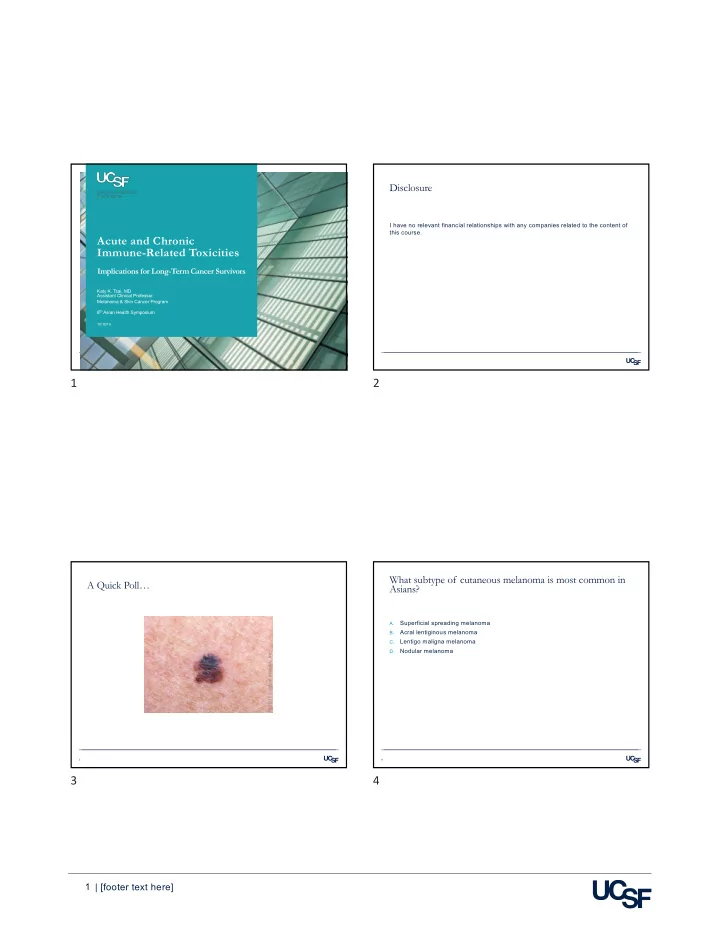

Disclosure I have no relevant financial relationships with any companies related to the content of this course. Acute and Chronic Immune-Related Toxicities Implications for Long-Term Cancer Survivors Katy K. Tsai, MD Assistant Clinical Professor Melanoma & Skin Cancer Program 8 th Asian Health Symposium 10/10/19 1 2 What subtype of cutaneous melanoma is most common in A Quick Poll… Asians? Superficial spreading melanoma A. Acral lentiginous melanoma B. Lentigo maligna melanoma C. Nodular melanoma D. 3 4 3 4 1 | [footer text here]
Acral lentiginous melanoma This Session § Immunotherapy – What is it? § Immune-Related Adverse Events - Mechanisms of Toxicity - Management § Best Practices & Survivorship § Questions 5 6 5 6 This Session Immunotherapy is not Chemotherapy § Immunotherapy – What is it? § Immune-Related Adverse Events = - Mechanisms of Toxicity - Management § Best Practices & Survivorship § Questions 7 8 Prsentation Title 7 8 2 | [footer text here]
Immune Checkpoint Inhibition (ICI) FDA-approved Immune Checkpoint Inhibitors Priming phase Anti-CTLA-4 Effector phase Anti-PD-1/L1 Figure adapted from Abdul Abbas, MD 9 10 9 10 This Session Immune-Related Adverse Events (irAEs) § Immunotherapy – What is it? § Unique spectrum of side effects arising from general immune system enhancement § Immune-Related Adverse Events - Mechanisms of Toxicity - Management § Best Practices & Survivorship § Questions Enstoff et al, Future Oncology 2017. 11 12 11 12 3 | [footer text here]
GENERAL • Fatigue Possible Mechanisms of Toxicity PULMONARY • Infusion reactions • Pneumonitis OCULAR • Uveitis/scleritis • Conjunctivitis DERMATOLOGIC • Rash • Pruritus CARDIAC • Vitiligo • Myocarditis • SJS/TEN • Arrhythmias RHEUMATOLOGIC ENDOCRINE • Arthralgias/myalgias • Hypophysitis • Myositis • Thyroiditis (hyper/hypo) • Sicca syndrome • Adrenal insufficiency • Diabetes (Type I) RENAL • Nephritis (acute tubulointerstitial) GASTROINTESTINAL NEUROLOGIC • Diarrhea/colitis • Motor/sensory neuropathy • Hepatitis HEMATOLOGIC • Guillain-Barré syndrome • Pancreatitis • Thrombocytopenia • Autoimmune encephalitis • Neutropenia • Red cell aplasia • Aseptic meningitis • Myasthenia gravis • Cryoglobulinemia Postow et al, N Engl J Med 2018. 13 14 13 14 Classifying Acute vs. Chronic Classifying Severity Weber J et al, JCO 2012, 2017. 15 16 15 16 4 | [footer text here]
For Example… General Management 17 18 17 18 Which immune checkpoint inhibitor regimen has a higher irAE Incidence incidence of side effects, and/or more severe side effects? Ipilimumab A. Nivolumab B. Ipilimumab + nivolumab C. Pembrolizumab D. Larkin J et al. N Engl J Med 2015. 19 20 19 20 5 | [footer text here]
All immune-related adverse events eventually resolve. Time to Resolution of Grade 3-4 irAEs True A. False B. Endocrine Skin GI Sznol M et al, JCO 2017. 21 22 21 22 This Session § Immunotherapy – What is it? § Immune-Related Adverse Events - Mechanisms of Toxicity - Management § Best Practices & Survivorship Implications § Questions 24 23 24 6 | [footer text here]
Best Practices Best Practices PATIENT Education PROVIDER Education § Empower early symptom reporting § Risk assessment for side effects § Address integrative medicine concerns - Pre-existing autoimmune illness? Organ transplant? § Address family planning concerns - Long-term steroid use § “Post-treatment teaching” - Medication reconciliation - Transition from oncology to primary care § Resources for irAE management - Published consensus guidelines - Continuing education workshops Brahmer et al. JCO 2017. Puzanov et al. JITC 2017. 25 26 NCCN Guidelines for the Management of Immunotherapy-Related Toxicities. 25 26 Takeaway Points Thank you! katy.tsai@ucsf.edu § You will care for patients who ARE RECEIVING immunotherapy, or who HAVE RECEIVED immunotherapy and are re-integrating into primary care. § Overall survival has improved in so many different cancers! Continued age- appropriate cancer surveillance and HEALTH MAINTENANCE should continue. § Be willing to investigate unusual complaints. Immune-related adverse events can be ATYPICAL and/or LATE. § Don’t hesitate to phone a friend. Current guidelines are expert consensus-driven rather than evidence-based (for now). 27 27 28 7 | [footer text here]
Recommend
More recommend